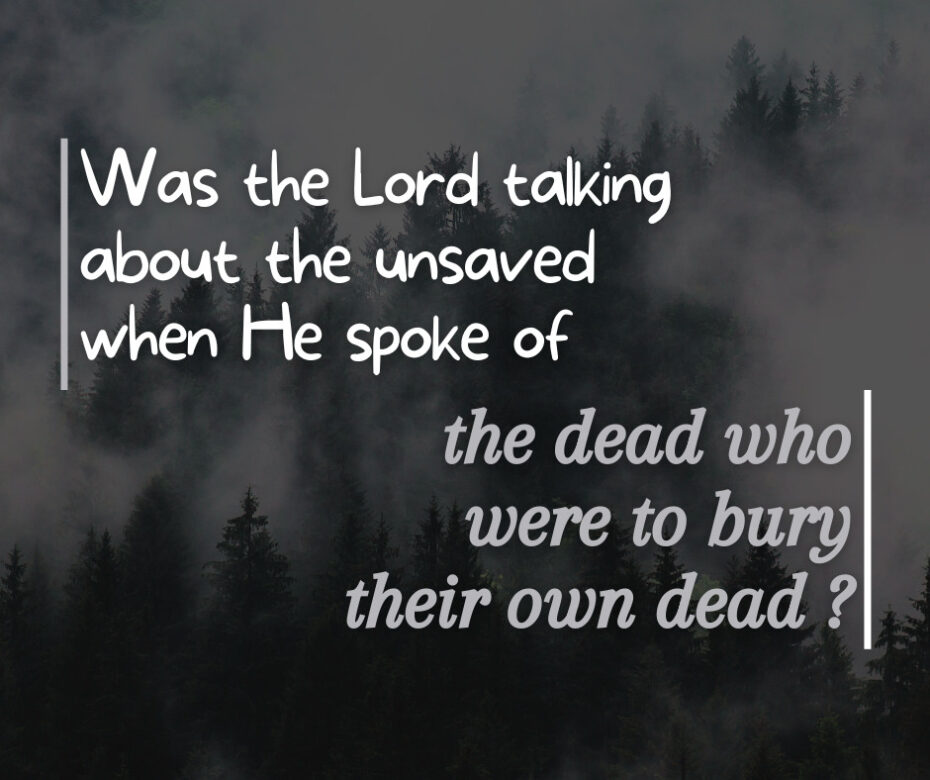This question came up in my Sunday School class yesterday. It left me wondering what the Lord meant.
Jesus told a man, “Follow Me.” The man said, “Lord, let me first go and bury my father” (Luke 9:59). The Lord replied:
“Let the dead bury their own dead, but you go and preach the kingdom of God” (Luke 9:60).
Notice that the Lord told him to “go and preach the kingdom of God.” The issue here is not regeneration. The matter under discussion is service for Christ.
Hodges spoke on this passage in a message entitled, “The Committed Christian” (Luke 9:57-62). You can listen to the thirty-eight-minute message here. He made it clear that the man Jesus spoke with had everlasting life (cf. 20:10). Concerning Luke 9:60, Hodges says:
“What this man was saying was something like this: ‘Lord, I’ve got responsibilities at home. I’ve got an aging father. And I need to take care of my father. And when my father is dead and when my father is buried, then maybe I’ll be ready to follow You…’ It boils down to this: ‘Not now, Lord. Not now. Later, Lord. Later…’(16:30-17:10).
Then Hodges applied that to his audience:
“Maybe at some time or other you’ve said to yourself, ‘You know, I really want to get down to business someday and really live the Christian life. I really think I need to do that. But first, let me do this or that. Lord, I’ll follow You, but first well let me earn a bunch of money to construct a safety net for myself…First, I’d like to get married and raise a family…’” (17:30-18:20).
He went on to say, “Jesus Christ wants your commitment. But He doesn’t want a reluctant commitment. He doesn’t want the type of commitment that says, ‘Not now. Later.’ He wants an unhesitating, top-priority commitment” (18:20-18:40).
Hodges suggests that the expression “let the dead bury their own dead” means that God “will take care of my affairs even if He has to use unsaved people to do it” (21:50-57). “We are prepared to cut the ties [with our parents and siblings]. We are prepared to set aside anything that stands between us and the will of God” (23:10-23:30).
In my Sunday school class, I mused that while the dead in Luke 9:60 could refer to the unsaved, it might simply refer to anyone not in fellowship with God and anyone not serving Him. Might not a believer who was unwilling to serve Christ now be one who could be called dead? When the prodigal son returned, his father said, “For this my son was dead and is alive again; he was lost and is found” (Luke 15:24). He did not mean his son had had everlasting life, lost it, and got it back. He meant that his son had been in fellowship with him, lost that fellowship when he went to the far country, and regained fellowship with him when he returned.
I’m open. Maybe by the dead in Luke 9:60, the Lord meant those lacking everlasting life. Or maybe He would even include those who have everlasting life but are out of fellowship with Him.
Either way, Hodges is right about the main point. The Lord is calling for our “unhesitating, top-priority commitment.” We will not be properly prepared to preach about Christ’s coming kingdom if we have the type of not now, Lord attitude that Hodges warned against.


